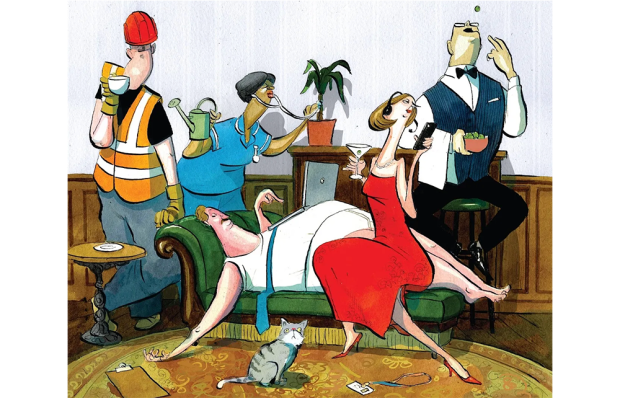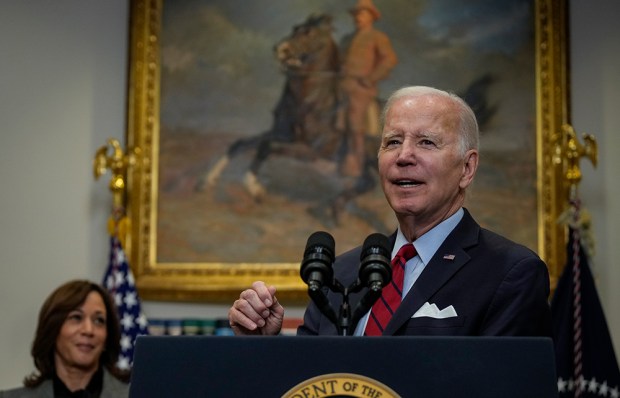The more anticipated a parliamentary appearance, the less it tends to live up to its billing. But Dominic Cummings’s testimony before MPs on Wednesday was one of the more remarkable parliamentary moments of this century. His attacks on his former boss were jaw–dropping. He said that it wouldn’t have helped if Boris Johnson had chaired Cobra meetings at the start of the crisis since the Prime Minister didn’t take Covid seriously and that it was ‘completely crazy’ that the country had to choose between Johnson and Jeremy Corbyn at the last election (this remark was particularly astonishing given Cummings’s influence on the Conservative campaign). But his criticisms of the entire way that the British state works were just as significant. It says something that the claim that the then deputy cabinet secretary described the country as ‘absolutely fucked’ after she had inspected the pandemic plan was one of the less noteworthy moments of the day.
Cummings’s evidence comes just as there is a new, more transmissible Covid variant. Scientists are beginning to get nervous, but Johnson is optimistic and determined to push on with the easing of lockdown restrictions. It is tempting to say that we know how this will end. More scientists will voice their worries in public. The pressure on Johnson to act will grow. Eventually, and reluctantly, the PM will accept the need to once more curtail people’s liberties.
There is, however, a crucial difference this time: the vaccines. They are a reason to hope that the story will not have the same ending, because they should mean that the link between cases, hospitalisations and deaths is broken. (Though it should be noted that as of Tuesday, 33 people have been admitted to Bolton hospital with Covid in the past seven days, compared with 13 the week before.) Senior figures in government think cases will rise between now and 21 June, the date when the restrictions are meant to lift, but that the re–opening should not be delayed. One points out to me that the government’s roadmap always assumed cases would increase as restrictions were eased. ‘The whole point of the vaccine is that they do stop people ending up in hospital,’ he says.
There does appear to have been a subtle shift in government thinking away from the idea that the goal is to keep Covid cases down. The rationale behind this previously was that the lower the rate of Covid circulating in the population, the less chance there was of a vaccine-evading variant emerging. There’s now much greater confidence in government that the vaccine will work on any likely variant. The greater emphasis is once more on hospitalisation numbers. As long as the NHS is not at risk of being overwhelmed, Johnson is keen to press on.
It is telling that when the idea was raised ahead of 17 May that the government should pause the easing of lockdown restrictions because of the rise of the Indian variant, Johnson dismissed the idea even though Michael Gove was sympathetic to it.
The vaccines make a political difference too. For months now the government has been telling people that the vaccines are the way out of this pandemic (the ‘scientific cavalry coming over the brow of the hill’, as Johnson put it in November). The public has responded by taking up vaccination in large numbers. The UK is on course to vaccinate 90 per cent of its adult population, which will make it easily the most immunised major country. If the government were now to turn around and say that the reopening had to be delayed, the public might begin to wonder what the point was of having their jabs.
The vaccine and its rollout have made voters forgive, or forget, the government’s earlier missteps in this crisis. Cummings’s critiques would have caused far more problems for the Prime Minister if it hadn’t been for the success of the vaccine programme. People are prepared to be more understanding about the mistakes the government made last year because they can now see an end to this crisis. If that way out is significantly delayed, the public mood could well change.
There are two key pieces of data which will determine how comprehensive the re-opening will be on 21 June. The first is how effective the vaccines are against the Indian variant. The information on this from Public Health England is encouraging but it does suggest that the second dose is particularly important in terms of providing resistance to this variant. This is why the government has shortened the time between first and second dose from 12 weeks to eight, in a bid to increase the number of people who have been fully immunised.
Sixty per cent of the adult population are in the priority group for the vaccine; that is, in the section of the population that accounts for 99 per cent of Covid deaths. If all these people have had both jabs by 21 June, the reopening will be considerably safer. Currently, 43 per cent of all adults have had both doses, which suggests it should be possible to reach the rest of the priority group in time.
The second question is how transmissible the Indian variant is. According to papers published by Sage, it is a ‘realistic possibility’ that it is up to 50 per cent more transmissible than the Kentish variant. If the true figure is at the top of this range, then a full reopening would likely lead to another big wave of cases and put pressure on hospitals. But the view in Whitehall is that if it is only 30 per cent more transmissible, then it should be safe to proceed with reopening. More data on this is expected next week.
There is, of course, a compromise option. The government could abolish the legal limits on social contact but keep in place social distancing and the work from home guidance. The signs are that Johnson would much prefer a cleaner reopening. Certainly, many hospitality businesses would struggle to keep going if they had to continue to enforce social distancing — which forces them to operate below capacity — after 21 June. A more comprehensive return to normality would also bring back city life, something Johnson is particularly keen to see.
Cummings’s testimony will turn Westminster’s focus back onto the events of last year, and what the government should have done differently and who was ultimately responsible for its errors. But as long as the vaccination programme keeps the lifting of the restrictions on course, then the national conversation is unlikely to follow suit.
Got something to add? Join the discussion and comment below.
Get 10 issues for just $10
Subscribe to The Spectator Australia today for the next 10 magazine issues, plus full online access, for just $10.
You might disagree with half of it, but you’ll enjoy reading all of it. Try your first month for free, then just $2 a week for the remainder of your first year.















Comments
Don't miss out
Join the conversation with other Spectator Australia readers. Subscribe to leave a comment.
SUBSCRIBEAlready a subscriber? Log in